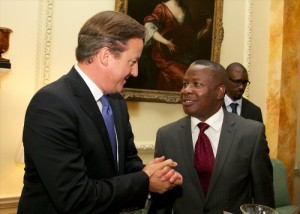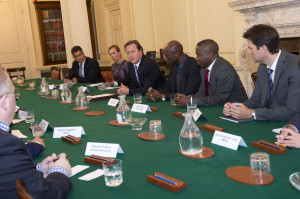African Voice was recently invited, along with a small group of ethnic media editors, to a Round Table meeting at 10 Downing Street to discuss issues and areas of concern relating to the ethnically diverse population he was elected to represent.
As an adjunct to the meeting, African Voice was granted a brief opportunity to put questions pertaining specifically to Britain’s African community to Prime Minister David Cameron.
We would like to thank Mr Cameron for taking time out of his undoubtedly busy schedule to offer the following responses.
AFRICAN VOICE: The role of the migrant community, particularly those of African descent, has been variously described as very healthy for the British economy and growth by politicians and business moguls. Will the method of immigration prosecution of these people not undermine their value and contributions to the country without sending negative signals to them?
MR DAVID CAMERON: Immigration has brought significant benefits to Britain and our migrant communities are a fundamental part of who we are. Our country is a far richer and stronger society because of them, whether it’s doctors, nurses, artists, entrepreneurs or hard–working businessmen and women. They are part of our island story: open, diverse and welcoming, and I am immensely proud of it.
However, it is important that our immigration system is fair and not abused. We want to ensure that people who do come here are the brightest and the best, with the skills and talent to help create the jobs and growth that will help us to win in the global race. And it also means ensuring that the system is fair so that we support the aspirations of hard-working people who want to get on in life and do the right thing. I know these are aspirations shared by African Voice readers.
AV: What policy avenues are you considering to harvest effectively all that they could bring to the socio-economic table of Britain?
DC: There are over a quarter of a million black and minority ethnic-led small and medium sized enterprises in the UK, contributing an estimated £30 billion to the British economy so we acknowledge the significant contribution they make. Just this month we announced an extra £69 million to support new businesses and entrepreneurs. Our initiative to help aspiring start-ups is harnessing the extraordinary talent from across Britain’s communities and I’m pleased to say that over 40% of the new businesses in the scheme have been set up by black and minority ethnic people – a sure sign that people of all backgrounds are having a stake in Britain.
AV: On British political party representation; Africans believe the Conservative Party is quite remote from them. Do you think that ethnic representation is adequate within your party?
DC: The number of BME Conservative MPs elected at the last election increased from two to 11, so we’ve made progress already but I realise there is still more to do. I am determined to keep increasing the representation of ethnic minority communities throughout the Conservative Party at every level. That must start by engaging properly with diverse communities around Britain, showing the values we share, winning the trust and support of more BME voters and then persuading more to join us and put themselves forward for council elections and as prospective MPs.
AV: What is your position on Proportional Representation?
DC: The public had the opportunity to vote for a new voting system just over two years ago but decided to keep ‘First Past the Post’. Proportional Representation takes power away from the man and woman in the street and hands it to the political elites. Instead of voters choosing their government on the basis of the manifestos put before them in an election, party managers would choose a government on the basis of secret backroom deals. First Past the Post is a fair voting system that is used the world over. It is used by 2.4 billion to elect their representatives; it is used in over 60 countries including the United States and India, the biggest democracy in the world.
AV: What is British government doing to tap Africa’s huge market opportunity?
DC: For too long, politicians in this country looked at Africa and saw only the problems of that continent, not the potential. This is now changing.
Africa is open for business. Many African nations are among the world’s fastest growing economies and the continent as a whole is predicted to see strong growth over the next decade. It’s vital that we are a part of that story. Not just because more UK trade and investment is good for Africa and good for development, but because it’s good for Britain too. That’s why I flew to Africa with a planeload of business leaders in 2011, and that’s why Justine Greening, my international development secretary, has made such a priority of promoting economic growth.
As well as supporting vital things like immunisations, healthcare and education, the UK is taking concrete steps to help improve the investment climate and break down barriers to trade between African countries – whether tariff barriers or things like red tape at border crossings.
Alongside our G8 partners, we’re helping get more infrastructure investment into Africa. And we’re helping to promote much more transparency and openness in how money from extractive resources like oil and gas is used, so as to spur development.
It is through increased trade, growth and jobs that Africa will realise its huge potential – something that will benefit us here in the UK as well as the people of Africa.
AV: In view of Britain’s relationship with Nigeria, does your government have any plan(s) to commemorate Nigeria’s centenary?
DC: We are looking forward to taking part in Nigeria’s centenary celebrations next year. 2014 is an important milestone for Nigeria as it marks 100 years since the unification of a great country and valued friend of Britain. As our High Commissioner recently declared, our bilateral history, culture and people-to-people connections remain very strong and mutually beneficial. But I think the best is still yet to come as we forge ever closer links.
Britain’s Nigerian community has contributed so much to Britain in so many ways: business, education, science, public service and the arts, the list of extraordinary talents goes on and on. The Diaspora also help keep the close bond between our two great countries, and I’m sure next year as the country salutes its centenary they will bring joyous Nigerian celebrations to towns and cities across Britain.












